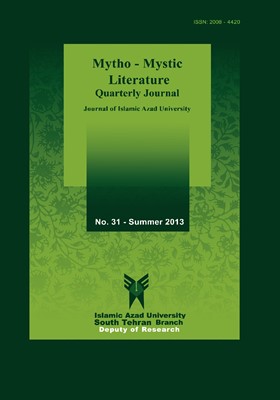A Study on Jamshid's Destiny
Subject Areas : MythoMahmood Jafari Dehagi 1 , Zahrā Dashtbān 2
1 - Associate Professor of Ancient Culture and Languages, Tehran University
2 - M. A. Graduate of Ancient Culture and Languages, Tehran University
Keywords: Jamshid, Sin, mercy, kingship, Worshipping,
Abstract :
According to most of the Iranian narratives, Jamshid is a mythical character who lost his power, kingship, charisma, and immortality because of committing a sin which its nature is not known exactly; and at last, he was wandering for a while and then was killed by Zahhak. According to whatever mentioned in old sources, Jam's era represents a time of pure happiness. However this everlasting dignity and power is deteriorated due to committing a sin by him, and he who once considered as one of the best mythical kings, lost his face, in a way that his golden age came to a bitter end. In various stories remained about his fate and downfall he and his life are portrayed very differently. While in a number of stories he and his dynasty are considered as the God worshipers, others refer to him as a deviant and unbeliever in God. It is claimed that he have committed two types of sins, among them eating and feeding animal flesh, disobeying Ūrmazd and also claiming to be God. In the present study we try to reveal some of the dark aspects related to this ancient king, and by comparing existing stories, this study tries to shed light on these differences. Besides, we try to answer this question that whether or not Jamshid has really committed a sin, by comparing different viewpoints provided about the problem.
کتابنامه
آموزگار، ژاله. 1381. تاریخ اساطیری ایران. تهران: سمت.
ابن بلخی. 1313. فارسنامه ابن البلخی. تصحیح جلالالدین طهرانی. تهران: بینا.
ایرانشاه ابن ابیالخیر. 1377. کوشنامه. به کوشش دکتر جلال متینی. تهران: علمی.
اسدی طوسی، ابو نصر علی بن احمد بن منصور. 1354. گرشاسبنامه. تصحیح حبیب یغمایی. تهران: طهوری.
بلعمی، ابوعلی محمد بن محمد. 1353. تاریخ بلعمی (تکمله و ترجمه تاریخ طبری). تصحیح محمد تقی بهار. به کوشش محمد پروین گنابادی. تهران: زوار.
بهار، مهرداد. 1377. از اسطوره تا تاریخ (مجموعه مقالات). گردآورنده ابوالقاسماسماعیل پور. تهران: نشر چشمه.
ثعالبی نیشابوری، ابو منصور عبدالملک بن محمد اسماعیل. 1368. تاریخ ثعالبی مشهور به غرر اخبار ملوک الفرس. تصحیح هرمان زوتنبرگ. ترجمه محمد فضائلی. تهران: نشر نقره.
خالقی مطلق، جلال. 1387. حماسه. تهران: بنیاد دایرهالمعارف بزرگ اسلامی.
رجبی، پرویز. 1375. جشنهای ایرانی. تهران: آرتامیس.
روایت پهلوی. 1367. ترجمه مهشید میرفخرایی. تهران: مؤسسه مطالعات و تحقیقات فرهنگی.
صفا، ذبیحالله. 1384. حماسهسرایی در ایران. تهران: امیر کبیر.
طبری، ابو جعفر محمد بن جریر. 1352. تاریخ طبری. ترجمۀ ابوالقاسم پاینده. تهران: بنیاد فرهنگ ایران.
فردوسی، ابوالقاسم. 1373. شاهنامه (بر اساس چاپ مسکو). به کوشش دکتر سعید حمیدیان. تهران: قطره.
کریستنسن، آرتور. 1385. نخستین انسان و نخستین شهریار. ترجمه احمد تفضّلی، ژاله آموزگار. تهران: چشمه.
متینی، جلال. 1369. «پایان زندگی جمشید و سرگذشت خاندانش»، در هفتاد مقاله (ارمغان فرهنگی به دکتر غلامحسین صدیقی). گردآورنده یحیی مهدوی و ایرج افشار. تهران.
ــــــــــ. 1375. «برخی از نیرنگهای کارزار در کوشنامه»، ایرانشناسی، سال 11. شماره1.
مجملالتواریخ و القصص. 1318. تصحیح محمد تقی بهار. تهران: کلاله خاور.
مسعودی، علی بن الحسین. 1356. مروجالذهب و معادن الجواهر. ترجمۀ ابوالقاسم پاینده. تهران: بنگاه ترجمه و نشر کتاب.
مینوی خرد. 1364. ترجمه احمد تفضّلی. تهران: توس.
یشتها. 1347. ترجمه ابراهیم پورداود.تهران: طهوری.
English References
Darmester, J, 1894. Zand-Avesta. Oxford.
Tafazzoli, Ahmad. 1971. Acta Orientalia. 33. P.197-198.
_||_
English References
Darmester, J, 1894. Zand-Avesta. Oxford.
Tafazzoli, Ahmad. 1971. Acta Orientalia. 33. P.197-198.
References
Āmouzgār, Zhāleh. (2002/1381SH). Tārikh-e asātiri-e Iran. Tehran: Samt.
Asadi Tousi, Abu-nasr 'Ali ibn A'hmad ibn Mansour. (1975/1354SH). Garshāsbnāmeh. Ed by 'Habib Yaghmāei. Tehran: Tahouri.
Bahār, Mehrdād. (1998/1377SH). Az ostoureh tā tārikh (Articles). Collected by Abu-l-qāsem Esmā'ilpour. Tehran: Cheshmeh.
Bal'ami, Abu-'Ali Mohammad. (1974/1353SH). Tārikh-e Bal'ami. Ed. By Mohammad Taqi Bahār. With the efforts of Mohammad Parvin Gonābādi. Tehran: Zavār.
Christensen, Arthur. (2006/1385SH). Nakhostin ensān o nakhostin shahriār (Les types du premier home et du premier roi dansl'histoire légendaire des Iraniens). Tr. By A'hmad Tafazzoli and Zhāleh Āmouzegār. Tehran: Cheshmeh.
Ferdowsi. Abo-l-qāsem. (1994/1373H). Shāhnāmeh. With the efforts of Saeed Hamidiyān. Tehran: Qatreh.
'Hamza ibn ol-Hasan Esfahāni. (1988/1367SH). Tārikh-e payāmbar-ān o shāhān. Tr. By Ja'far Sho'ār. Tehran: Amirkabir.
Ibn Balkhi. (1934/1313SH). Fārsnāmeh. Ed. By. Jalāl-oddin Tehrani. Tehran: (?).
Iranshāh ibn Abi-l-kheir. (1998/1377SH). Koushnāmeh. Ed by Dr. jalāl Matini. Tehran: 'Elmi.
Khāleqi Motlaq, Jalāl. (2008/1387SH). 'Hamāseh. Tehran: Boniād-e dāyerat-ol-ma'āref-e bozorg-e eslāmi.
Mas'oudi, 'Ali ibn el-'Hosein. (1977/1356SH). Morouj-ozzahab wa ma'āden-ol-jawāher. Tr. By Abo-l-qāsem Pāyandeh. Tehran: Bongāh-e tarjemeh o nashr-e ketāb.
Matini, Jalāl. (1990/1369SH). “Pāyān-e zendegi-e Jamshid o sargozasht-e khānedān-ash”. In Haftād maqāleh. Collected by Ya'hyā Mahdavi & Iraj Afshār. Tehran.
---------------. (1996/1375SH). “barkhi az neirang-hā-ye kārzār dar Khoush-nāmeh”, in Iran-shenāsi. Year 11. No. 1.
Minavi, Mojtabā. (1978/1357SH). “dāstān-hā-ye 'hamāsi-e Iran dar ma'ākhez-i gher az shāhnāmeh”, Simorgh mag. No. 2.
Minooy-e kherad (1985/1364SH). Tr. By Ahmad Tafazzoli. Tehran: Tous.
Mojmal-ottawārikh wal-qesas. (1939/1318SH). ed by Mohammad Taqi Bahār. Tehran: Kolāle-ye Khāvar.
Rajabi, Parviz. (1996/1375SH). Jashn-hā-ye Irāni. Tehran: Ārtāmis.
Revāyat-e Pahlavi. (1988/1367SH). Ed. By Mahshid Mirfakhrāei. Tehran: Moassese-ye motāle'āt o ta'hqiqāt-e farhangi.
Sa'ālebi Neishābouri, Abu-Mansour 'Abd-ol-malek ibn Mohammad Esmā'eil. (1989/1368). Tārikh-e Sa'ālebi. Ed. By Herman Zotenberg. Tr. By Mohammad Fazāeli. Tehran: Noqreh.
Safā, Zabi'h-ollah. (2005/1384SH). Hamāse-sarāei dar Iran. Tehran: Amirkabir.
Tabari, Abu-Ja'far Mohammad ibn Jarir. (1973/1352SH) Tārikh-e Tabari. Tr. by Abo-l-qāsem Pāyandeh. Tehran: Boniād-e Farhang-e Iran.
Yasht- ha. (1968/ 1347SH). Tr. by Ebrāhim Poordāvood. Tehran: Asātir.


